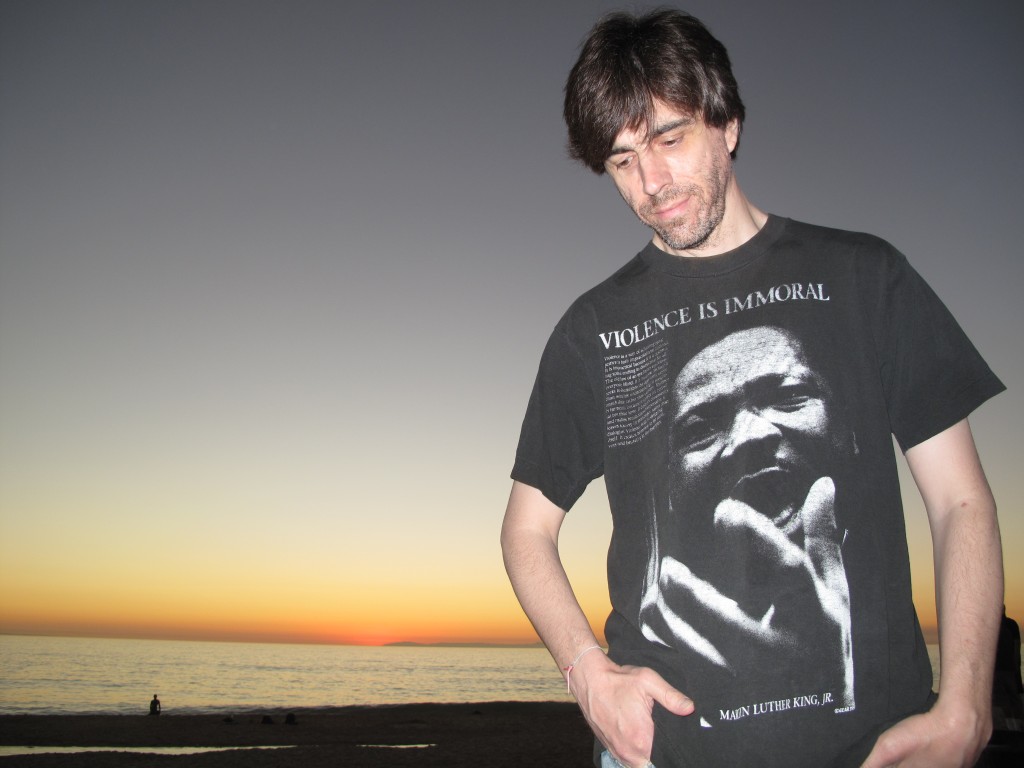We can all be King for a day
 (Mona caught me at Aliso beach, watching the sunset and reflecting on our day of service.)
(Mona caught me at Aliso beach, watching the sunset and reflecting on our day of service.)
When I was a kid I had a habit of reading ahead. I may not have been the best math or science student, but I loved my English classes and I’d zoom ahead of the reading assignments. I don’t remember any of the stories I came across in that grade school reader, but one continues to stick out in my mind — and it’s a story I’ve absorbed many times since then in other forms from documentaries to books. It’s the story of how a young, charismatic preacher from Atlanta reluctantly agreed to be nudged into the national spotlight to lead bus boycotts in his new parish in Montgomery, Alabama. It was also a story of how a brave black woman riding the bus home from work got sick and tired of segregation and refused to give up her seat for a white person.
In my fourth-grade reader the story was as simple as that — how two people defeated a racist system and led the way to fairness for all. The Montgomery Bus Boycotts — good triumphs over evil. Of course, as I researched it and understood it more as I grew older I understood the civil rights movement was a lot more complex than that. And, yet, as I consider it now, it really is that simple at its core. We know, for instance that there were more heroes than just Dr. King, during the civil rights movement, and that some envious leaders even complained King would just swoop in and take the credit later. I never saw any sense to that view, though. While it was true there were many heroes during the civil rights era who laid the groundwork before King came in and triumphed, it took a leader of that quality for the public to rally around. That’s how it always is in movements.
And I was a good example of the effectiveness of that tactic. I was a white kid living in an often racist, provincial neighborhood of Chicago, which was at that time, one of the most segregated cities in America (it still is, come to think of it). Thankfully, my mother and her father were exceptionally open-minded and progressive when it came to race relations. Much of my world view comes from them. But there was something about that story on Dr. King that sparked my fascination with him. And I dimly recall that at the time I wasn’t so concerned about the racial element to the story as I was to the general message that good can overcome evil through nonviolence. I saw so much of that in the stories of Jesus Christ that I was also reading at the time. I suppose, for me, it was the Christlike quality in King that had me admiring him so. I can also recall my mother giving me a biography of Gahndi so I could learn more about the origins of the modern nonviolent movement. What a wonderful coincidence when I moved in with Mona to find out she had the same book.
And what a wonderful coincidence for me as a professional journalist to meet John Maguire, past president of Claremont Graduate University, who met Dr. King in divinity school when they were young. They struck up a lifelong friendship that led Maguire to the Freedom Rides. and later to archive his writings. King, you see, as a student was greatly influenced by Gandhi and was eager to try the same civil disobedience in America.
The more I would defend King among my racist classmates the more heat I took. But I didn’t really care much. To me, I would think, if Jesus could forgive his tormentors as they drove nails into his hands and Dr. King could so bravely overcome the fear of bomb threats, death threats, stabbings, but not, finally, that assassin’s bullet then I could put up with silly taunting from ignorant classmates. I wasn’t doing anything even remotely heroic. But I tried to do what I could.
Which is what I did today. As President Obama called on us to continue to turn King’s birthday holiday into a day of service, I took the day off from work and Mona and I donated food to the Lighthouse church in Costa Mesa and Share Our Selves, a nonprofit in Costa Mesa that provides a variety of services to the poor from food to medical, dental and psychiatric care. Mona and I were saddened to hear that Pastor Dale at the Lighthouse has retired and moved on as he was central to my piece on going homeless for a day. The last time we saw him he was recuperating in the hospital from a serious malady. It reminded me to strive harder to stay in touch with my friends. We also donated some food to Share Our Selves because I really believe it’s a remarkable resource for the needy. Where else can a homeless person actually get to see a social worker? And how obvious is it that most need that kind of basic service if they are ever to get back to normalcy? Look at poor Ted Williams. He hit the celebrity Lotto and yet found he had to go into rehab because the demons still haunted him.
Here’s a final, sort of amusing note about our efforts to serve today: We tried to donate blood to the American Red Cross, only to find out they closed for the holiday. Huh? Seems to me today was the best day for the Red Cross to be open. Maybe next year, eh?














Lovely piece, Pablo…. speaking of staying in touch with friends…